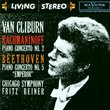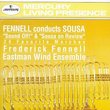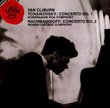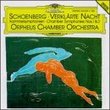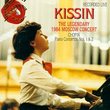| All Artists: Franz Liszt, Herbert von Karajan, Berlin Philharmonic, Shura Cherkassky Title: Liszt: Orchestral Works / Karajan Members Wishing: 0 Total Copies: 0 Label: Deutsche Grammophon Release Date: 7/14/1998 Genre: Classical Styles: Forms & Genres, Concertos, Symphonies, Theatrical, Incidental & Program Music, Historical Periods, Modern, 20th, & 21st Century, Romantic (c.1820-1910), Instruments, Keyboard, Symphonies Number of Discs: 2 SwapaCD Credits: 2 UPC: 028945313023 |
Search - Franz Liszt, Herbert von Karajan, Berlin Philharmonic :: Liszt: Orchestral Works / Karajan
 | Franz Liszt, Herbert von Karajan, Berlin Philharmonic Liszt: Orchestral Works / Karajan Genre: Classical
|
Larger Image |
CD DetailsSimilarly Requested CDs |
CD ReviewsNice Liszt Collection With One True Gem Michael B. Richman | Portland, Maine USA | 12/18/2003 (4 out of 5 stars) "This "2CD" DG collection of the Orchestral Works of Franz Liszt is quite enjoyable, if not essential. I personally prefer larger, more comprehensive sets of Liszt's Tone Poems, and other pieces for Orchestra, by conductors Haitink and Masur (see my review of the new EMI boxed-set of the latter). However, Herbert von Karajan and the Berlin Philharmonic offer the best selection of the pianist/composer's works aside from his Concertos on this set. Three of these exact same performances ("Les Preludes," "Mazeppa" and "Hungarian Rhapsody No. 4") also appear on a mid-line DG "Originals" title, but this is the set to get if you want Karajan performing Liszt. On this two-fer you get eight selections to only three on the aforementioned mid-priced single disc. And if you were thinking about his later digital remakes instead, these glorious stereo accounts from the 1960s and 70s exceed them by far (earlier is generally better with Karajan in my opinion). But for me the star of this set is not Herbie but pianist Shura Cherkassky, one of the last great "romantic" pianists. An enormously popular figure at the dawn of the LP era, Cherkassky has slipped into obscurity half a century later. To the best of my knowledge, his only other vintage title currently available is a DG "Originals" disc coupling his late mono performances of the 1st & 2nd Tchaikovsky Piano Concertos (see my review). His 1961 stereo performance of "Fantasia on Hungarian Folk Melodies" captured here is worth the price of this set alone." Accomplished readings that don't quite burn the house down Santa Fe Listener | Santa Fe, NM USA | 03/13/2010 (5 out of 5 stars) "As the lead review indicates, these are accomplished performances that lack, however, the last bit of fire and conviction. On these two CDs we have almost in total the surviving orchestral works of Liszt. He has a far vaster output of tone poems, and there are transcriptions of all the Hungarian Rhapsodies. But history has winnowed out the music that is so vapid and bombastic that even the glamorous name of Liszt cannot bring modern listeners to sit still for it. Karajan was more dismissive of Liszt than this two-fer might suggest. He didn't make commercial recordings of the two piano concertos, Totentanz, or Liszt's recognized masterpiece for orchestra, the Faust Sym. On the other hand, I believe I've counted up three recordings of "Les Preludes," which in it day was as poplar and ubiquitous as the 1812 Overture. These remarks would be insulting to Hungarians, however, who treasure all of Liszt. Since the world has been gifted with so many Hungarian conductors (Szell, Reiner, Kertesz, Fricsay, Ormandy, et al.) it's rather surprising that they recorded so little Liszt.
Over the decades I've heard very few recordings that really burn the house down. It does no good to play Liszt with half a heart. This is music for the Errol Flynn that lurks inside peaceable listeners; if your blood isn't racing, you are apt to notice how rickety and rhetorical Liszt's writing actually is. Karajan's penchant for finesse doesn't serve him well in that department. Insofar as Liszt is still esteemed as the inventor of the toen poem, Karajan doesn't condescend to the music but brings out as much detail and sparkle as possible. I prefer the raw, rough handling given by Hermann Scherchen, but those much-reissued recordings from the Fifties use the scrappy vienna State Opera Orch., and here we have the glorious Berlin Phil. The recordings cover a fifteen-year span, begging with the Fantasia (1960) and Mazeppa (1961), ending with a session in 1975 that included the Hungarian Rhapsodies 2 & 5 and Tasso. The sound quality varies but is never less than good, and as always, the engineers aim for a huge orchestral soundstage. Even if Mephisto is a bit of a gentleman here and Mazeppa doesn't tear up the plains, it would be hard to surpass this two-fer. Haitink and Masur, two leading rivals, are weak tea by comparison, and Mehta is sleepwalking half the time." |

 Track Listings (4) - Disc #1
Track Listings (4) - Disc #1


